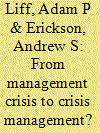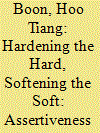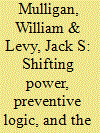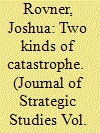|
|
|
Sort Order |
|
|
|
Items / Page
|
|
|
|
|
|
|
| Srl | Item |
| 1 |
ID:
153322


|
|
|
|
|
| Summary/Abstract |
Since 2012, China’s assertion of its sovereignty claim to the contested Senkaku/Diaoyu Islands has significantly raised the risk of a potentially escalatory political-military crisis with Japan. As circumstances worsen, Japanese Prime Minister Shinzo Abe has championed major institutional reforms aimed at centralizing Japanese security policy decision-making and vastly improving crisis management. This article assesses these reforms’ significance for ameliorating Japan’s long-standing internal crisis management weaknesses, and enhancing its ability to communicate with Beijing promptly under challenging conditions. While significant issues remain, recent developments – especially the establishment of Japan’s first-ever National Security Council – demonstrate significant progress. Bilaterally, however, important firebreaks remain conspicuously absent.
|
|
|
|
|
|
|
|
|
|
|
|
|
|
|
|
| 2 |
ID:
153323


|
|
|
|
|
| Summary/Abstract |
There is a growing view that the emerging brand of Chinese regional diplomacy in recent years is increasingly assertive. This article attempts to make better sense of this perceived more forceful Chinese diplomacy. It argues that Chinese regional behavior is more profitably understood through the lens of a two-pronged foreign policy strategy that combines two particular aspects. One is a tougher and more uncompromising approach toward issues that China regards as concerning its core interests. The other is a more flexible and cooperative position toward interests that, while significant, are of secondary importance.
|
|
|
|
|
|
|
|
|
|
|
|
|
|
|
|
| 3 |
ID:
153324


|
|
|
|
|
| Summary/Abstract |
This article analyses the doctrine development of the People’s Liberation Army (PLA) coping with the Soviet military threat between 1969 and 1989. In the 1970s, the PLA applied a doctrine of ‘active defence and luring the enemy into depth’ based on its traditional operational art. In 1980, the PLA decided to focus its doctrine on positional defence. In 1986, the PLA introduced ‘integrated operations and prioritised strike’, a generalised doctrine that originated from its war history. Many organisational and intellectual challenges in peacetime doctrine development contributed to the PLA’s operational idealism, including its aging leadership, command structure, attitude towards its previous experience, limited analysis of contemporary military developments, and failure in test and validation of doctrines. In the post-Cold War decade, many of these challenges persisted in spite of military modernization efforts. The ongoing military reform has to address these challenges and improve the PLA doctrine development in peacetime.
|
|
|
|
|
|
|
|
|
|
|
|
|
|
|
|
| 4 |
ID:
153326


|
|
|
|
|
| Summary/Abstract |
If a declining state has incentives for preventive war, the rising state should have incentives to delay a confrontation until it is stronger. We develop the theoretical paradox and examine the July 1914 crisis. Why did Russia, rising relative to Germany, not adopt a buying-time strategy? We argue that although most Russian leaders hoped to avoid a confrontation, they feared that the failure to support Serbia would lead to a loss of Russian credibility and a significant setback to Russia’s position in the Balkans, one that could not easily be reversed, even with Russia’s expected increase in relative military power.
|
|
|
|
|
|
|
|
|
|
|
|
|
|
|
|
| 5 |
ID:
153325


|
|
|
|
|
| Summary/Abstract |
China’s expanding strength and ambition may foreshadow a violent conflict with the United States. I describe two scenarios about how such a conflict would unfold. The article begins by examining the prospects for nuclear escalation, drawing on theories about politics, psychology, and inadvertent escalation. It then examines the prospects for protracted conventional war, a scenario that has received far less attention. I present a new theory of protraction based on technology, geography, and domestic politics. After assessing the logic of both scenarios against a hypothetical US–China conflict, I discuss which is more likely. The conclusion points to a sobering trade-off: efforts to avoid nuclear catastrophe increase the chance of a long and grueling fight.
|
|
|
|
|
|
|
|
|
|
|
|
|
|
|
|
|
|
|
|
|